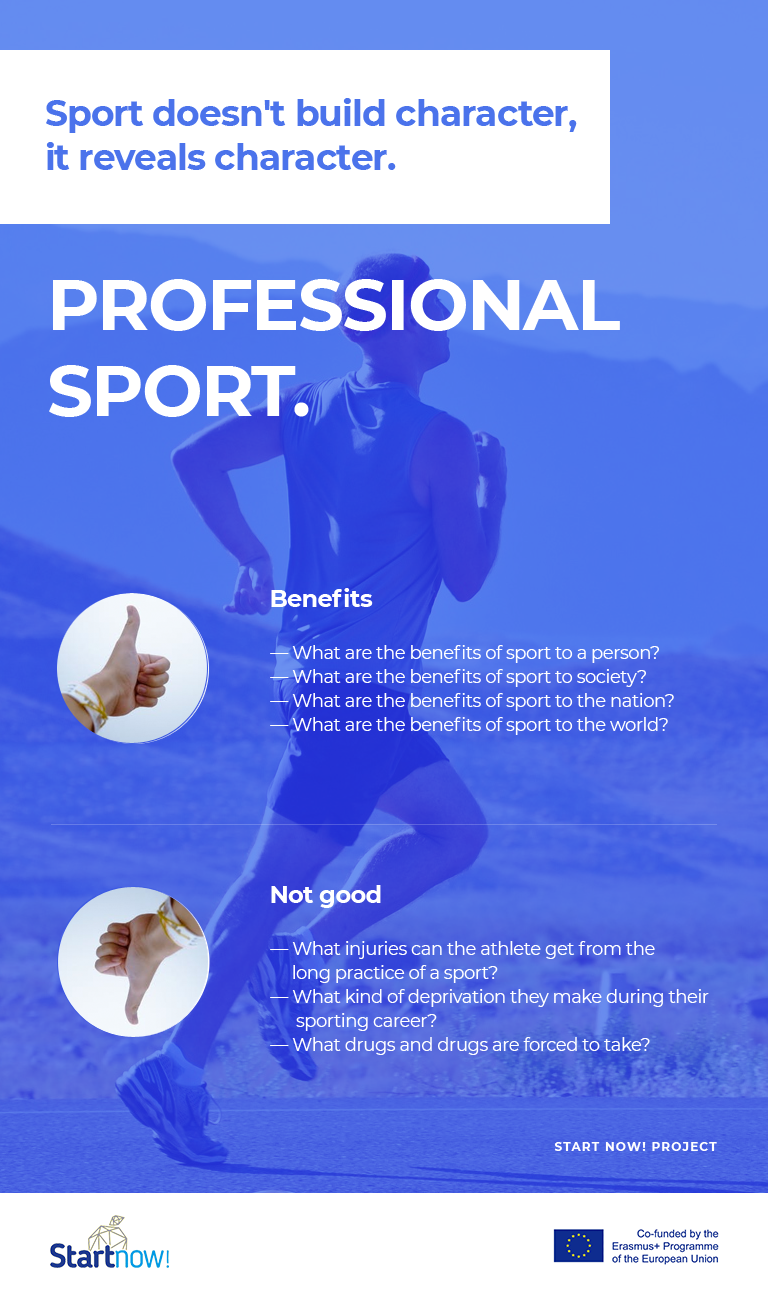Professional sports – Angel or Demon?
Physical activity
***
3 hours
„Haka - Maori dance”
Duration: around 15-20 mins.
Group size: from small to large
Materials: large room
Hints for the Facilitator:
- Make sure that you enough space for all participants.
- Make sure that everyone in the group feels comfortable.
- Make sure that the environment is safe.
The Facilitator describes the movements for each of the following. He/she further explains that hands, feet, legs, body, voice, tongue and eyes all play their part in blending together the Haka. The Facilitator, spurs on the team, before leading the dance, with the following chant:
Ringa pakia (Slap hands against thighs)
Uma tiraha (Puff out the chest)
Turi whatia (Bend the knees)
Hope whai ake (Let the hip follow)
Waewae takahia kia kino (Stamp the feet as hard as you can)
Ka mate! Ka mate! (It is death! It is death!)
Ka ora! Ka ore! (It is life! It is life!)
Tenei te tangata puhuru huru (This is the hairy person)
Nana i tiki mai (Who caused the sun to shine)
Whakawhiti te ra (Keep abreast! Keep abreast!)
A hupane kaupane! (The rank! Hold fast!)
A upane kaupane whiti te ra! (Into the sun that shines!!).
Start slowly! Repeat several times.
1. „Get it, know it“
Duration: around 20-25 mins.
Group size: from small to large
Materials: sheets, pens, flip chart.
The Facilitator proceeds to a group discussion with the following questions:
- What are the benefits of sports to a person?
- What are the benefits of sports to the society?
- What are the benefits of sports to the nation?
- What are the benefits of sports to the world?
Each participant writes down the answers in a piece of paper. Participants are given 5 minutes to answer all questions. After that, it is a surprise. Everyone submits his answers to his neighbour’s questions to the left, and the neighbour on the left has to protect them and answer them. The Facilitator writes the answers on the flip chart
Once all participants’ responses are registered, a discussion is followed, including the following questions.
- What injuries can the athlete get from the long practice of a sport?
- What kind of deprivation they make during their sporting career?
- What drugs and drugs are forced to take?
- How does their social life develop due to their long training and sports camps?
- Each participant writes down the answers on a piece of paper. Participants are given 5 minutes to answer all questions. At the end, the Facilitator registers all different answers.
2. „Let’s sport be funny for all of us“
Duration: around 40-45 mins.
Group size: from small to large
Materials: sheets, pens, flip chart, Wi-Fi, PC or smart phones, markers etc.
The Facilitator divides participants into smaller groups and gives each group a task:
Team A
- What are the benefits of professional sport for the society?
- Aims to use the benefits of sport on the problems of integration, multiculturalism, anti-racism, and integration, problems facing social exclusion, working with people at risk, working with people with various mental or physical problems.
Team B
- Do children imitate sport stars? How? Is this useful or harmful?
- The team undertakes the task of minimizing the risk of problems faced in professional sports and sports for all – programs for athletes with injuries, recreation programs, anti-doping campaigns and campaigns against the use of stimulant substances among sportsmen etc.
Team C
- What are the risks of professional sports? Please provide examples.
- Injuries, premature end of sports career, depressions of loss, use of doping and banned substances.
Team D
- What are the benefits of the professional sport to the economy, infrastructure, the labor market, health?
- Hosted national events, international championships, Olympic Games – how do they affect the infrastructure and the labor market?
At the end, each team presents their work, for approximately 10-15 mins.
3. „The Olympic Games“
Duration: around 40-50 mins.
Group size: from small to large
Materials: sheets, pens, flip chart, Wi-Fi, PC or smart phones, markers, chairs, table etc.
The Facilitator assigns 2-3 participants as jury and then divides the other participants into 2 groups. Then He/she gives each group a task: To prepare, present and defend their candidacy about hosting the Olympic Games.
Both teams have 25 minutes to prepare their presentation and 5 minutes to present their presentations.
At the end of each presentation 5 minutes are provided for questions and answers from both the jury and the other team.
The Facilitator, together with the selected participants, form the Commission for selection of the host city of the Olympic Games, prepare the pressroom and the order of presentation of the two teams.
Finally, everyone votes in secret, the Facilitator counts the valid ballots and announces the host of the Olympic Games.
Hints for the Facilitator:
- Make sure the two teams are equal in number.You can always choose one more person for a jury
- Make sure that everyone in the group feels comfortable.
- You can divide participants according to their talents and interests, not to make them feel uncomfortable preparing or presenting a topic in the way they do not feel happy
Provide enough time and materials – for preparation and presentation.
Evaluation
After the end of all activities, the Facilitator asks each participant what is their favourite sport, a favourite team or sports star, what are the benefits of sports to him/her and the society, what are the risks of using stimulants or banned substances.
"Clean sport"
All participants will be asked to create a campaign on social media (as a group or an individual) portraying a sport star or sport team who promote „Clean sport” (without anabolics and steroids). Campaign or posts and pictures must have their own hashtag (#CleanSport, #StartNow, etc.).

This work is licensed under a Creative Commons Attribution-NonCommercial-ShareAlike 4.0 International License.

